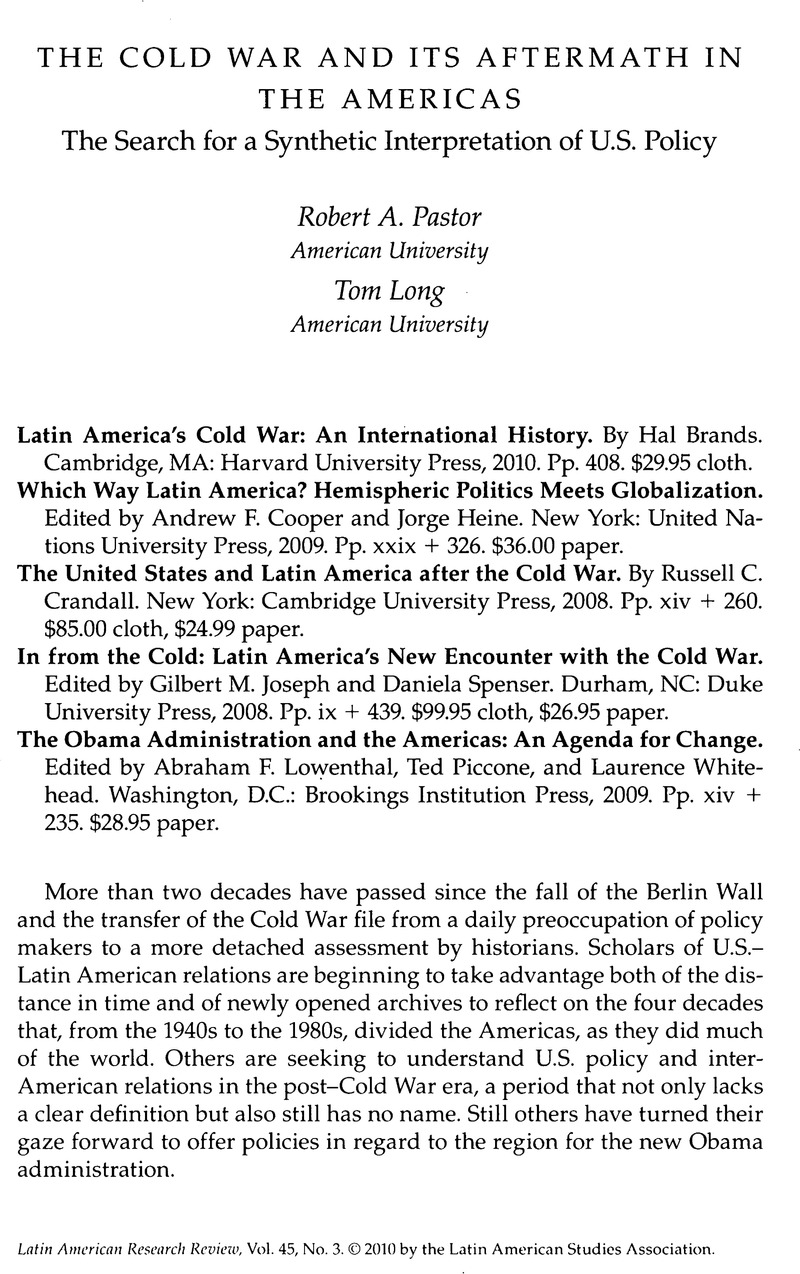Published online by Cambridge University Press: 05 September 2022

1. Thomas F. O'Brien, “Interventions, Conventional and Unconventional: Current Scholarship on Inter-American Relations,” Latin American Research Review 44, no. 1 (2009): 257–265; Gregory Weeks, “Recent Works on U.S.-Latin American Relations,” Latin American Research Review 44, no. 1 (2009): 247–256; Andrés Rivarola Puntigliano, “Suspicious Minds: Recent Books on U.S.-Latin American Relations,” Latin American Politics and Society 50, no. 4 (2008): 155–172.
2. Peter H. Smith, Talons of the Eagle: Dynamics of U.S.-Latin American Relations, 2nd ed. (New York: Oxford University Press, 2000), 4.
3. Lars Schoultz, Beneath the United States: A History of U.S. Policy toward Latin America (Cambridge, MA: Harvard University Press, 1998).
4. Robert A. Pastor, “Explaining U.S. Policy toward the Caribbean Basin: Fixed and Emerging Images,” World Politics 28, no. 3 (1986): 483–515.
5. Max Paul Friedman, “Retiring the Puppets, Bringing Latin America Back In: Recent Scholarship on United States-Latin American Relations,” Diplomatic History 27, no. 5 (2003): 626.
6. Friedrich Katz, The Secret War in Mexico: Europe, the United States, and the Mexican Revolution (Chicago: University of Chicago Press, 1981).
7. Piero Gleijeses, Shattered Hope: The Guatemalan Revolution and the United States, 1944–1954 (Princeton, NJ: Princeton University Press, 1991).
8. See Stephen G. Rabe, Eisenhower and Latin America: The Foreign Policy of Anticommunism (Chapel Hill: University of North Carolina Press, 1988), 77–83; Kyle Longley, The Sparrow and the Hawk: Costa Rica and the United States during the Rise of José Figueres (Tuscaloosa: University of Alabama Press, 1997).
9. Walter LaFeber, Inevitable Revolutions: The United States in Central America (New York: W. W. Norton, 1983).
10. Robert A. Pastor, Not Condemned to Repetition: The United States and Nicaragua (Boulder, CO: Westview Press, 2002), chap. 1.
11. Greg Grandin, Empire's Workshop: Latin America, the United States, and the Rise of the New Imperialism (New York: Henry Holt, 2006).
12. Bayless Manning coined the term intermestic, in “The Congress, the Executive, and Intermestic Affairs: Three Proposals,” Foreign Affairs 55 (1977): 306–324.
13. The Brookings Institution, “Rethinking U.S.-Latin American Relations” (November 2008) (accessed at http://www.brookings.edU/reports/2008/~/media/Files/rc/reports/2008/1124_latin_america_partnership/1124_latin_america_partnership.pdf).
14. Robert A. Pastor, “The Future of North America: Replacing a Bad Neighbor Policy,” Foreign Affairs 87, no. 4 (2008): 84–98.
15. Organization of American States, 39th General Assembly, “Resolution on Cuba” (A.G. Res. 2438), San Pedro Sula, Honduras, June 3, 2009 (accessed at http://www.oas.org/dil/AG04688E08.doc).
16. Robert A. Pastor, Exiting the Whirlpool: U.S. Foreign Policy toward Latin America and the Caribbean (Boulder, CO: Westview Press, 2001). On the interactive thesis, also see Pastor, “Explaining U.S. Policy.”
17. John Mearsheimer, The Tragedy of Great Power Politics (New York: W. W. Norton, 2001). There is a certain irony in the congruence of views between radicals, who are embarrassed by the pursuit of U.S. power, and realists, who expect it as a rule of international relations.
18. It is true that one reason that the United States rejected the idea of annexing all of Mexico was racism and sectional differences. However, realists argue that state expansion responds to the balance of power and not to internal causes.